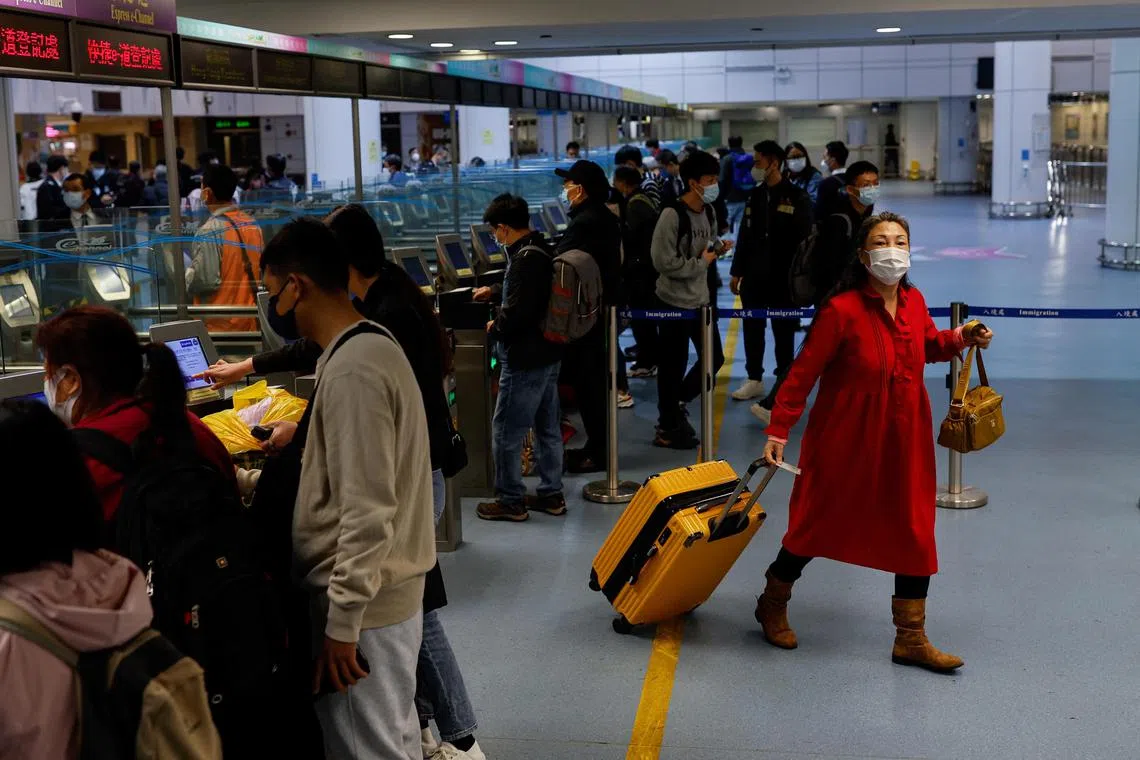Hong Kong-China border reopens as city looks to rebuild economy
Sign up now: Get ST's newsletters delivered to your inbox

Travellers at Hong Kong's Lo Wu Control Point on Monday, the first day China fully resumed cross-border travel to the city and Macau.
PHOTO: REUTERS
Follow topic:
HONG KONG – The border between Hong Kong and mainland China fully reopened on Monday
Daily quotas and testing requirements were dropped and all boundary checkpoints opened, freeing visitors from some of the world’s toughest virus-related travel measures.
A ban on unvaccinated travellers from anywhere in the world has also been lifted.
The opening marks a big step in Hong Kong’s bid to rebuild its reputation as a business hub connecting mainland China and the rest of the world, and comes days after Chief Executive John Lee unveiled a publicity campaign to revive the economy and welcome back visitors.
Hong Kong had doubled down on some of the strictest Covid-19 restrictions in recent years even as other cities opened up, raising questions about its status as a global financial centre.
Mr Lee is working to attract new investment to the city, and has prioritised returning Hong Kong to normal life and regaining its status as a finance hub after protests in 2019, the imposition of national security laws in 2020 and the pandemic.
That includes a bid to convince the oil giant Saudi Aramco as well as its units to consider a secondary listing in Hong Kong, the South China Morning Post reported on Sunday.
While the lengthy closure had a devastating impact on the city’s economy and business, money has been flowing back into Hong Kong as investors bet on a recovery in China and the city after the nation’s pivot away from its zero-Covid policy.
The local benchmark Hang Seng Index has surged almost 50 per cent since the end of October.
Concerns about Hong Kong’s future remain despite the revival campaign: A mass trial of prominent pro-democracy figures
At the same time, Mr Lee has dismissed calls for an independent commission to look into the city’s handling of the pandemic.
The city was forced to turn to the central government for help early in 2022, when the rapid spread of the Omicron variant caused a wave of deaths among the unvaccinated elderly, resulting in one of the deadliest outbreaks globally
China reopened its border with Hong Kong early in January in a limited manner, and the mainland is retaining a 48-hour pre-arrival polymerase chain reaction test requirement for people coming from Hong Kong or Macau if they have travelled overseas in the previous seven days.
Mainland visitors to Hong Kong could rebound to 78 per cent of 2019 levels this year with the removal of restrictions, including a daily traveller quota and mandatory Covid-19 tests, according to Bloomberg Intelligence.
The tourism rebound – along with visitors’ spending perks under the new HK$2 billion (S$338 million) tourism campaign – stands to raise the city’s 2023 retail sales by 22 per cent, said consumer and technology analysts Catherine Lim and Trini Tan.
BLOOMBERG

